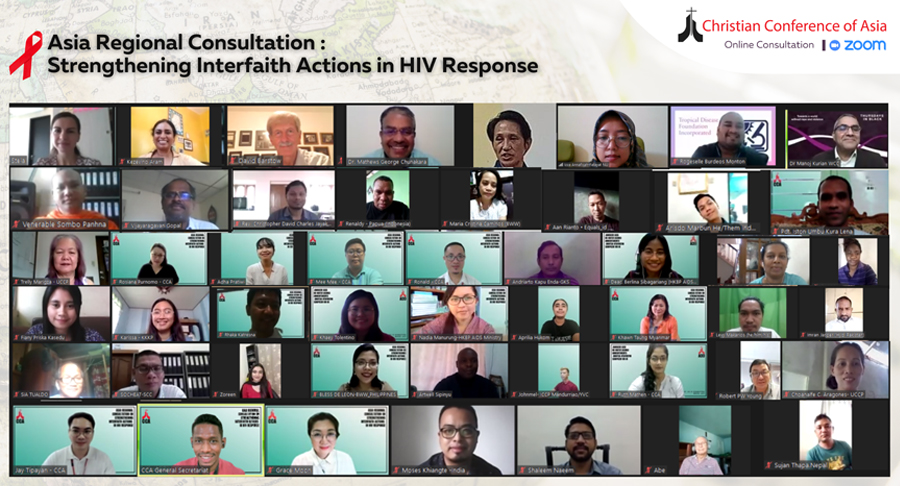CCA Consultation resolves to ‘put faith in action’, moving forward to end AIDS by 2030
 Participants of Asia Regional Consultation: Strengthening Interfaith Actions in HIV Response
Participants of Asia Regional Consultation: Strengthening Interfaith Actions in HIV Response
A two-day Asia Regional Consultation on ‘Strengthening Interfaith Actions in HIV Response’, organised by the Christian Conference of Asia (CCA) on 21–22 September, saw a call to action by various faith leaders from Asia and beyond.
The thirty-five participants collectively affirmed, “Serving others is the foundation of religion and faith communities should be a safe and sacred space for all irrespective of their HIV status and vulnerabilities. It is a journey towards justice for every human being and towards peace and harmony in the community without stigma and discrimination.”
The consultation began with an opening address by Dr Mathews George Chunakara, the General Secretary of the CCA, who mentioned that religious leaders had been at the forefront in taking care of those infected and affected with HIV since the epidemic started. With examples of Buddhist monks in Cambodia and Muslim leaders in Indonesia, Dr Chunakara said that faith leaders have shown compassion and care, at times acting even before governments started their programmes.
Stela Sacaliuc, Executive Officer of the UNAIDS Regional Support Team for Asia and Pacific, reported that current data demonstrated an increased incidence of new infections in Asia. She emphasised the positions of trust that faith leaders had at the heart of their communities, and that their mission to serve communities enabled them to provide services and support that extended beyond the reach of many conventional services and systems.
“The global strategies to eradicate HIV and AIDS acknowledge the distinctive and extensive contributions of faith communities and FBOs (faith-based organisations) in providing HIV services, care, and support to the key affected populations,” said Ms Sacaliuc.
Wangda Dorji from Lhak-Sam (Bhutan Network of Positives) conducted a session on breaking the barriers of stigma and discrimination in society towards HIV and suggested strategies for FBOs. He said that the origins of stigma and discrimination lay in social norms that governed religion and culture and stressed the necessity of individual action in breaking and confronting such norms.
“We can reduce stigma and discrimination if we put others before us,” said Mr Dorji while encouraging the participants.
Dr Kezevino Aram from Shanti Ashram, India, presented the challenges and opportunities that lie ahead for faith-based organisations in HIV response and particularly during the ongoing COVID-19 pandemic. She praised the crisis management of faith-based organisations in responding to HIV, elaborating on approaches that focused on science, assessment of vulnerabilities, improved socioeconomic wellbeing, and alleviating the suffering caused by the COVID-19 pandemic.
“Faith communities can be role models in acting and increasing the ability of others in the HIV response. This is not the time to conduct business as usual, but rather to break the culture of silence and advocate for the most marginalised and vulnerable,” said Dr Aram.
Izza Annafisatad Daniah from the Nahdlatul Ulama (NU), the largest Islamic organisation in Indonesia, shared the experiences of the women Muslim faith leaders in Indonesia in responding to HIV and AIDS issues. She affirmed that faith communities and faith-based organisations must accompany the government and other related agencies, using the same strategies and policies to come up with complementary actions rather than fragmented ones. There are difficult topics like sex and sexuality within the faith communities, but the level of response can be appropriately designed as per the needs of the people.
To understand the importance and role of faith in HIV response for the upcoming decade, Dr David R Barstow, a long-time AIDS activist from the Presbyterian Church of USA and author of the book ‘HIV and AIDS in 2030: A Choice Between Two Futures’, presented the strategies of the Global Interfaith network, which included recommendations from the local congregational level, to national and international forums.
“Faith can be helpful and harmful and those who are regularly associated with religious events, playing a crucial role in changing the attitude of others and the communities around them,” added Dr Barstow.
Rogeselle B. Monton from the Philippines shared his perspective as a person living with HIV and how faith communities could be a bridge between government programmes and the community—implying the general population, and not merely the key affected population. He also drew attention to the challenges in many healthcare facilities where unethical practices prevailed for PLHIVs and vulnerable communities.
The Consultation ended with a session on ‘Creating anInclusive and Enabling Environment for PLHIV and Key Affected Populations and a Call to Action’ by Dr Manoj Kurian, Coordinator of the WCC–Ecumenical Advocacy Alliance. He highlighted the different perspectives for faith-based institutions and organisations to respond to HIV and AIDS. He emphasised that a holistic response necessitated careful consideration of public health, human rights, voices from the margins, and pastoral and moral perspectives.
“Faith can build bridges between the marginalised, affected, and infected persons with HIV and the community at large, and this can be achieved only when we see divinity or God in others,” said Dr Kurian.
The two-day Consultation, organised under the banner of the CCA’s Action Together in Combatting HIV and AIDS in Asia (ATCHAA) programmatic thrust, offered a platform to define and discuss points of collaboration and action for faith-based organisations in responding to HIV and AIDS, with a focus on prevention, promotion of health, reduction of stigma and discrimination, enhancement of care, and advocacy at all levels.










